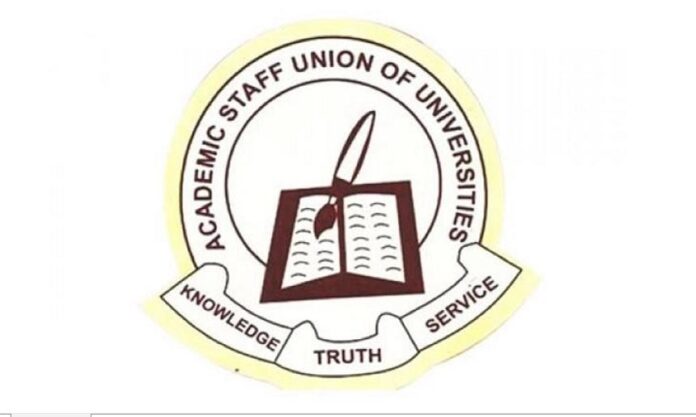ASUU hopeful withheld salaries will be released by Tinubu who is mending fences
By Jeph Ajobaju, Chief Copy Editor
University lecturers have expressed hope their eight months’ salary withheld in the Muhammadu Buhari years will soon be released by his successor, Bola Tinubu, who is bending over backwards to unify a country divided by Buhari’s incompetence.
Academic Staff Union of Universities (ASUU) President Emmanuel Osodeke, a Professor, gave the assurance to faculty members of Nnamdi Azikiwe University (UNIZIK), Awka during the foundation laying ceremony of ASUU NAU Guest House.
He thanked former ASUU Executive Committee and retired members for their sacrifices, stressing efforts are being made by the national body to ensure all salary arrears are paid.
Osodeke praised the chapter for its efforts in getting benefits for members in the medical line and urged the members not to give up on struggles that “are urgently needful.”
__________________________________________________________________
Related articles:
Jega accuses Ngige of waging personal war against ASUU to destroy varsity education
Nigeria spends $3.5b on foreign education on Buhari’s watch
Buhari’s ASUU failings cost Nigerians $609m in foreign education
__________________________________________________________________
Cordial relationship between varsity unions
UNIZIK Vice Chancellor Charles Esimone, a Professor, commended the cordial working relationship between ASUU and other unions since the present administration came on board, per reporting by The Nation.
Esimone, represented by Deputy Vice Chancellor (Administration) Joseph Ikechebelu, a Professor, also thanked the unions for the peace they have maintained in the university, and counselled them to sustain the tempo for more progress.
ASUU NAU Chairperson Stephen Ufoaroh explained the guest house, the second phase of the union’s secretariat complex, will provide accommodation for conference attendees, researchers, and other visitors.
The facility will also generate income and create employment, he added.
Abuja can no longer fund tertiary education, says VC of UNIBEN
Even with ASUU’s optimism, University of Benin (UNIBEN) Vice Chancellor Lilian Salami, a Professor, has warned Abuja can no longer fund tertiary education, despite pretenses, and the sector requires a comprehensive overhaul.
Salami, Chair of the Committee of Vice Chancellors of Universities of Nigeria, identified other challenges in tertiary education to include outdated curriculum, low-quality staff, corruption, decline in student reading culture, government agencies operating outside mandate, and confusion, quota system, internal politics in institutions, and low quality of students.
She made the disclosures in May in a keynote speech at the maiden Tertiary Education Summit themed “Fresh Ideas for Overhauling Nigeria’s Tertiary Education Complex”.
Salami argued the federal government alone can no longer fund tertiary education and parents need to bear the cost of educating their wards.
“There’s confusion in the system in doing the same things and returning to the same place. New ideas are therefore needed to overhaul the long overdue system.
“I believe what we need is a holistic approach whereby attention goes to these challenges. We need to redirect the system and walk the talk. When there’s a way, there’s a way,” she said.
Budgetary allocation to education
Salami cited dismal budgetary allocation to education as a stark indication of the government’s inability or unwillingness to fund education, saying UNIBEN receives a monthly budget of N11 million but spends N77 million on electricity alone and the school has to find creative ways to run itself.
“TETFund and ETF have been there, but they must be more robust. Education is allotted 8.2 per cent of Nigeria’s 2023 budget. Ghana allotted 12.8 in 2023, and South Africa allotted 18.4 per cent.
“At UNIBEN, we’ve undertaken the cost of training a student in each department. It takes N3 million to train a medical student per session, but such a student pays only N240 over six years.
“Interestingly, this amount is far less than paid in a private secondary school; some of us pay as much as N380,000 for our children in creches per term. Students must pay commensurate fees for their courses of study. We must pay for services rendered.”
Salami said students could receive financial help, including bursaries, loans for indigent but brilliant students, alumni associations annual levies, scholarships, and others.
“Good funding can redress dilapidated equipment, and other infrastructure, improved remuneration to motivate teachers and attract global scholars.”
ASUU to rethink strike option
Salami urged ASUU to rethink its strike strategy.
“The union must jettison its obsolete ideas and embrace new ideas on how to seek better working conditions. The union must hold an education summit on how to sustain education.
“The Committee of Vice Chancellors (CVC) is working on ways to make tertiary education meet international standards to make universities competitive. Curricula must be updated and must imbibe new teaching methods. E-learning must be adopted. Most courses should be on e-learning.”
She said universities should admit their students, saying those admitted for them are an unnecessary burden and Integrated Personnel and Payroll Information System (IPPIS) is a dead programme that hinders effective running of universities.
“Government should allow universities to pay lecturers to determine work rate and excellence. The almighty IPPIS is not the way to go. It’s fueling indiscipline, laziness, lack of commitment among teachers.”
Proliferation of low standard universities
Salami condemned the proliferation of universities, dismissing most of them as glorified nursery schools.
“The current system, as approved by NUC [National Universities Commission], is unproductive, wasteful and unsustainable. Institutions do not have to run all programmes.
“The mandate of the University of Agriculture should be on agriculture. Similarly, a polytechnic should be recognised for a certain area of technology. A medical university should be for medical sciences.
“A situation where a university undertakes courses it is ill-prepared for should be over. We must courageously avoid amorphous, amoebic, and shapeless programmes in tertiary institutions.”














